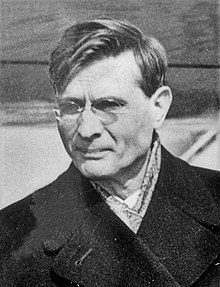
Back ميخائيل سوسلوف Arabic مايكل سوسلوف ARZ Суслов Михаил Андреевич Bashkir Міхаіл Андрэевіч Суслаў Byelorussian Міхаіл Суслаў BE-X-OLD Михаил Суслов Bulgarian Mikhaïl Súslov Catalan Michail Suslov Czech Michail Andrejewitsch Suslow German Μιχαήλ Σουσλόφ Greek
Mikhail Suslov | |
|---|---|
Михаил Суслов | |
 Suslov in 1964 | |
| First Second Secretary of the Communist Party of the Soviet Union | |
| In office 6 December 1965 – 25 January 1982 | |
| Preceded by | Nikolai Podgorny |
| Succeeded by | Konstantin Chernenko (de facto) |
| In office 14 September 1953 – 17 December 1957 [verification needed] | |
| Preceded by | Nikita Khrushchev |
| Succeeded by | Alexei Kirichenko |
| Senior Secretary of Ideology of the Communist Party of the Soviet Union | |
| In office 31 August 1948 – 25 January 1982 | |
| Preceded by | Andrei Zhdanov |
| Succeeded by | Konstantin Chernenko (acting) |
| First Secretary of the Stavropol Regional Committee | |
| In office 1939 – November 1944 | |
| Preceded by | Dmitry Goncharov |
| Succeeded by | Aleksandr Orlov |
| Personal details | |
| Born | Mikhail Andreyevich Suslov 21 November 1902 Shakhovskoye, Russian Empire |
| Died | 25 January 1982 (aged 79) Moscow, Russian SFSR, Soviet Union |
| Resting place | Kremlin Wall Necropolis, Moscow |
| Nationality | Soviet |
| Political party | CPSU (1921–1982) |
| Spouse |
Yelizaveta Alexandrovna
(died 1972) |
| Children | 2 |
| Residence | Kutuzovsky Prospekt |
| Alma mater | Plekhanov Russian University of Economics |
| Profession |
|
| Awards | Hero of Socialist Labor (twice) |
| Military service | |
| Allegiance | Soviet Union |
| Branch/service | Soviet partisans |
| Years of service | 1941–1945 |
| Battles/wars | |
Central institution membership Other political offices held
| |
Mikhail Andreyevich Suslov (Russian: Михаи́л Андре́евич Су́слов; 21 November [O.S. 8 November] 1902 – 25 January 1982) was a Soviet statesman during the Cold War. He served as Second Secretary of the Communist Party of the Soviet Union from 1965, and as unofficial chief ideologue of the party until his death in 1982. Suslov was responsible for party democracy and power separation within the Communist Party. His hardline attitude resisting change made him one of the foremost orthodox communist Soviet leaders.
Born in rural Russia in 1902, Suslov became a member of the All-Union Communist Party (Bolsheviks) in 1921 and studied economics for much of the 1920s. He left his job as a teacher in 1931 to pursue politics full-time, becoming one of the many Soviet politicians who took part in the mass repression begun by Joseph Stalin's regime. He was made First Secretary of Stavropol Krai administrative area in 1939. During World War II, Suslov headed the local Stavropol guerrilla movement.
After the war, Suslov became a member of the Organisational Bureau (Orgburo) of the Central Committee in 1946. In June 1950, he was elected to the Presidium of the Supreme Soviet. From 16 October 1952 onwards, he was a full member of the 19th Presidium of the CPSU. In the ensuing shuffle of the Soviet leadership following Stalin's death, Suslov lost much of the recognition and influence he had previously earned. However, by the late 1950s, he had risen to become the leader of the party opposition to First Secretary Nikita Khrushchev. When Khrushchev was ousted in 1964, Suslov supported the establishment of a collective leadership. He also supported inner-party democracy and opposed the reestablishment of the one-man rule as seen during the Stalin and Khrushchev eras. During the Brezhnev era, Suslov was considered to be the party's chief ideologue and second-in-command. His death on 25 January 1982 is viewed as starting the battle to succeed Leonid Brezhnev as general secretary.
© MMXXIII Rich X Search. We shall prevail. All rights reserved. Rich X Search